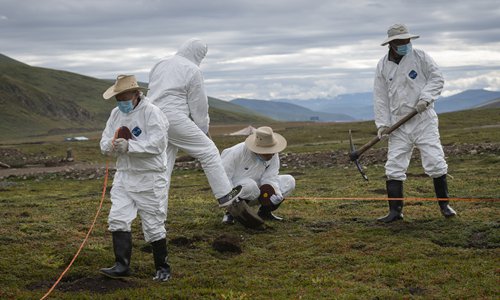HOME >> CHINA
Tougher measures taken against plague
By Wang Qi and Xu Keyue Source:Global Times Published: 2019/11/25 22:33:40
Banner in Inner Mongolia sprays raticide to kill rodents, fleas

Mice control team works in Ganzi, Southwest China's Sichuan Province to examine the population of the rodent and test whether they carries plague bacteria in September 2019. Photo: VCG
North China's Inner Mongolia Autonomous Region has implemented measures to control the plague, including quarantine and spraying fields from helicopters, after three human infections of the disease caused a regional panic.Public health experts said the plague could be controlled if people keep themselves away from wild animals carrying the bacteria, avoid going to possible infected places and timely report the epidemic status.
A man surnamed Liu, who was diagnosed with bubonic plague in Xiliin Gol League after eating wild rabbit meat, was recovering. His 28 close contacts had been removed from quarantine, the Xinhua News Agency reported.
This case, together with two people from Inner Mongolia who were confirmed with pneumonic plague in Beijing in mid-November, propelled regional governments to take various measures to control the infectious and fatal disease.
People entering and leaving the Huade county where Liu was treated have to register their personal information and temperatures, Shanghai-based news site jiemian.com reported on Monday.
Medical experts have organized training seminars on epidemic prevention to hundreds of local grass-roots medical workers. Leaflets on plague prevention provided by disease control and prevention authorities were also issued to local residents, Jiemian reported.
Disease control workers also strengthened monitoring of wild rodents such as rats and rabbits, and they had detected 14 infected animals.
Liu Qiyong, an expert at the Chinese Center for Disease Control and Prevention, told jiemian.com that it is critical to "kill the infected rats and fleas together."
Fleas carrying the disease-causing bacteria will find new hosts after the rats they infected died. If the fleas bite a person, one's risk of infection will increase, he said.
Inner Mongolia moved to kill rats and fleas, aside from conventional sanitation work and burning of infected animal carcasses. More than 300 local officials and medical employees wearing masks and gloves participated.
The government of the banner where Liu got infected dispatched 17 helicopters to spray more than 140,000 tons of raticide on more than 133 square kilometers of land.
Luo Yameng, a Beijing-based scholar in eco-city studies, told the Global Times that the emergency measure will have a negative impact on herders' lives.
The grasslands can no longer be grazed. Herders have to keep their sheep in enclosures and buy hay to feed them, Jiemian reported.
A resident surnamed Lang from Baotou in Inner Mongolia, 500 kilometers away from Xiliin Gol, told the Global Times that her family had received a government notice asking them not to eat wild animals, avoid going to villages and pastoral areas.
Experts suggested people not to hunt without permission, not to eat animals from infected areas, and not to take them away from epidemic areas. "If people follow the advice, they should be fine," a research fellow with the sanitary authority of Inner Mongolia told Jiemian.
Beijing's Chaoyang Hospital, which received the two pneumonic plague patients, remained cautious despite that the capital had removed their 42 close contacts from quarantine.
A Global Times reporter found that the hospital still asks visitors about their whereabouts in the past weeks, and investigate if they had a fever.
Posted in: SOCIETY